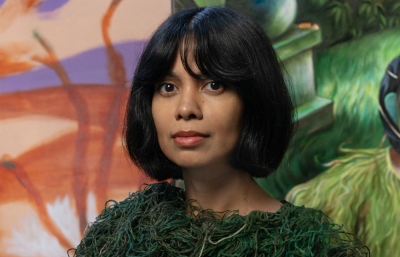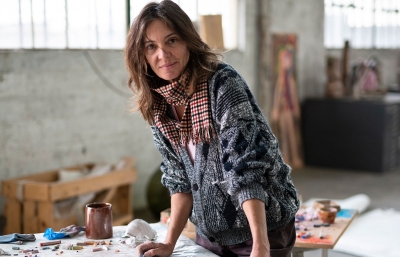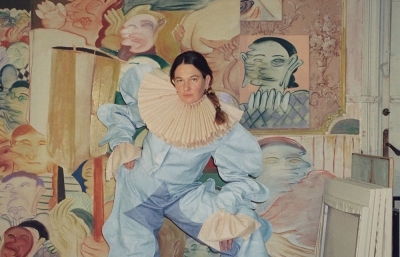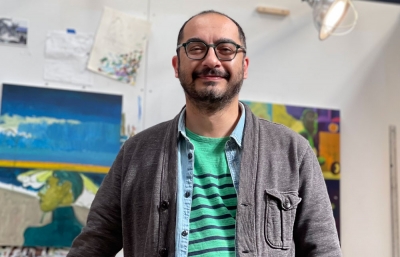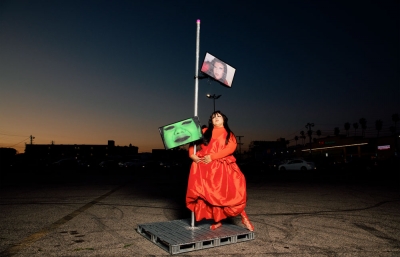
Axel Void
Multi-Named, Multi-Traveled, and Multi-Talented
Interview and Portrait by Sasha Bogojev
Null and void, as in Empty. That hardly describes the life and work of the painter, muralist, and installation artist known as Axel Void. However, the dictionary’s alternate definition, “not legally binding,” definitely works. The rules do not apply, he doesn’t apply them, and so he was a natural choice when Banksy sought subversive imagineers for Dismaland. A multicultural heritage, expanded by a familial vagabond spirit, Void was born in technicolor Miami and lived for a time in the brooding overcast of Berlin. A childhood in sunny Spain introduced him to the pervading ghost of Goya and his dark tonalities. An introduction to a can of spray paint bolstered his artistic arsenal. For him, the rules do not apply, unafraid as he is to probe the fears that haunt him, and, in truth, haunt us. The images, on canvas or a tall, wide wall, can be dark and beguiling, surprisingly macabre and mirthful, but arresting. Sasha Bogojev got together for a conversation with Alejandro Dorda Mevs, which naturally included photography, philosophy and porn.
Sasha Bogojev: Can we start with some info about your background, your life story?
Axel Void: I was born in Miami in 1986, my mom is Haitian and my dad was Spanish. When I was three years old, they decided to come back to Spain, and that's how I ended up in Cadiz. I stayed there until I was 18. From there, I went studying in Granada for a year, then to Sevilla.
Was that for art studies?
Yeah, fine art. After four or five years in Sevilla, I went to Berlin for three years, and now I'm living in Miami for the last three years.
So you never finished formal schooling?
No. I never really wanted to go to university. I thought I was just gonna continue painting and try to figure it out. But in Spain, you can choose a field in the last two years of school, so I chose art. After that, I did their "selectivity" test for the sake of it, but I didn’t study for it at all. Somehow I got an ok grade so I was, like, "Fuck it," and was just gonna try that out.

What did you do in Berlin?
There wasn't really a reason to move to Berlin, I just thought it might be nice. I guess I moved because it was a bigger city and more interesting, and Sevilla was getting to feel a little closed. Sevilla is a very comfortable place, very cultural. It has things, but it's very monotone somehow. I had different ideas of Berlin, which also ended up not being as I've expected.
How come?
I'm pretty pessimistic [laughs]. Actually, I try to make a fair judgement with things, but people tell me my judgement is generally pessimistic. I mostly lived in this punk house called 78 on a street with a bunch of punk houses. I like to put myself in interesting social or anthropological situations, and that definitely was one. Fifty people were living there, some straight-up punks, pseudo-fascist, but there were really nice people too. We would also take refugees or travelers. Crazy mix. But for me, it was the place itself. I don't wanna say Germany cause I've been to other places and it wasn't so hostile, but there was a certain hostility every time I went out in Berlin. What I did love there, and I really, really did, was my soccer team. That was kind of what kept me there. That and the people in my squat house.

Do you think that moving around a lot has influenced your work and how you see things?
Definitely. I've been moving since I can remember, and the longest time I spent was in Cadiz. And even there, every year we would move to a different house.
Wow! How come you were moving so much?
For some reason my mom and I liked it. And also I guess we found better deals, or sometimes we got kicked out ’cause we were trouble [laughs]. I just bought a house now, which is very strange. I'm already planning to leave!
At what point did you discover your interest in painting?
I've always been interested in painting, I guess as much as a kid is normally. But I was a really nerdy kid. I mean, not nerdy in a sense of how other people portray it. I was kind of a bad kid.
So a bad nerd? Nerd with attitude.
Yeah, I was a nerd with attitude! I always liked painting because I had it around me. My grandfather was a great painter, and my great grandfather as well. He was the painter for Franco, and he also did painting for royalty in Europe. He was a wild child. Also on my mother's side, my grandmother was a painter as a hobby. She painted memories of Haiti without ever using an image. It was kind of this longing or "saudade" for Haiti and the Virgin Islands. So I was always around it and I always wanted to improve my skills.
When did you start painting in the street?
At the edge of 12, I was skateboarding when I met this kid who had a spray can, which you couldn't get in Cadiz at the time. He just came to us and did a tag. Typical scene, like in the movies. I even remember what color it was—rojo fiebre, which is fiber red. So we went straight to the hardware shop and bought one of those cheap car paints and went crazy. We were in the newspaper every other day.

Did they know it was you?
They eventually did. I remember when my friend got arrested, and he's like, "I went in, I'm looking at the wall and I see a big ass photo of you!" Also, my neighbor, who was a cop, once caught me in the street and said, "Just tell me what you did,” because my friends would steal shit or sell drugs or whatever, but I told him "I don't do none of that stuff.” And I remember him being mad about cops being after me, ’cause I was just a kid doing graffiti. To be fair, we did paint trains, ambulances, and a police car. At that time, Cadiz wasn't as neat and nice, it was a little rough.
And how come you've decided to move to Miami?
My grandmother needed care and I really wanted to spend her last days with her. I really, really love her. She and my mom are pretty much the most special people in my life and they both live in Miami. I went there to be with them, and I ended up staying.
How did the move to Miami feel after Spain and Germany?
I felt like I was settling somehow, but not in a nice way because I like to be on the go. On the other hand, I realized it doesn't matter where I am, professionally, cause as long as I have an airport nearby, I can work. And Miami gave me the peace and the time to be in one space, concentrate and work. Generally, I'm not really fond of things you can do there, like the nightlife, which is kind of frivolous and ridiculous. Then, there’s the Wynwood district...
Yeah, I was gonna ask about your thoughts on that.
I'm not a fan of that. I generally just stay at home, focus and paint.
So you are pretty disconnected with what’s happening there?
I'm relatively close to it, like a seven-minute drive, but I’m also just far enough to not be touched by any of that.
You’ve been making emotive, engaged, often dark themed works. How did that come to be?
It's hard for me to put my finger on it, but I liked figurative painting since an early age, so I was always interested in the backstories.
Maybe it was when I painted a wall in Cadiz for a friend who passed away, Piki. I did a wall that was a little story of him in his neighborhood that is still there, untouched, untagged. Later on, I was painting under a bridge in Sevilla when I met some people living there. They were from Romania and Ukraine, so I wrote their names and "I am somebody.” It wasn't much, but it made me feel interested in where I am painting and talking about where I am. And then it just grew with time.
Do you think that those dark subjects got you into Dismaland?
From the interaction I had, Banksy just seemed to like the work I do, and I don't think it's necessarily because it's dark. But the nature of Dismaland was somewhat satirical, of a dismal, trashy theme park, and he definitely tried to curate people who would give a different sense to a "happy place.” I was really happy to participate, though I didn't like the wall cause it was difficult, hard to paint. Once I got there, though, I was really honored, especially learning that it was the main wall.

It was really nice to have that acceptance and trust. Banksy spent a ridiculous amount of money on doing something badass and funny, which made me feel respectful and flexible about the whole wall thing, so I wanted to make it work with everything else. I knew I had to create something dark, somehow metaphoric or poetic, and somewhat critical.
Do you think that public works should generally carry a message with the intent to engage?
I don't think there should be a right way to do things. This is getting a bit metaphysical, but I don't believe in good or bad. For instance, murdering someone. I don't think murder is wrong as stated in the Ten Commandments. Everything depends on the moment and the context. I do think that the sole purpose of art is reaching people and it is a strong way to touch people. Storytelling was part of our history since we started painting in the caves, so I like that approach, and I wish it was more common. Graffiti, for instance, is just the piece. It's more about exposure, the action of doing it. All these newer things, like street art and murals, can help you share something with people, and start a dialogue or somehow express yourself.
You often base the work on old photographs, both ones where you know the backstory, as well as completely random ones. How come those resonate with you so strongly?
I always try to find an equilibrium of a good formal aspect and a good conceptual aspect. Of course, and this is something I discuss a lot with my artist friends, for me, concept comes first. Whatever it is. If you're gonna write a book, and you write really well but you don't have shit to say, I don't care how well you write. Your book is shit. But if you're gonna write and you're not such a good writer, but you find a way just to write it well enough to express a very good story, then I think your book will be good. Personal images, photos or videos all help me learn from people. Just talking isn't enough. I need something that is a piece of history, some point in time, a snapshot.
Did you ever use your personal family photos as a reference?
I used to do that a lot because I have quite an interesting family, but I kind of stopped doing that for a while. Just recently, I started doing a painting of my mom and my dad when they had me, and I'm thinking of doing a show of my own family.
How different is your approach to what you're doing in the studio and stuff you do in public?
I would say it's the same thing with the exception that its not site specific and it's something that you can take home. When I do shows, I create new paintings just for that show, so all my shows are kind of like my walls. For example, Home—those paintings are just for that house and that environment and context.
You seem to enjoy working on series and projects. What are you working on now?
Well, I have few ongoing projects that don't have a place yet. One of them is a series about porn where I'm trying to be more satirical and humorous in my work. I feel like I am a very funny guy, and I really enjoy how humor opens people up. But the humor I enjoy is not an easy laugh, it's kind of an awkward laugh. So I'm taking models, guys, girls, different ages, normal people, and they direct their piece. The piece will be the painting, along with the real sexual story told by the model, but not necessarily a nice or sexy one.

I'm currently working on one about this girl's first time working in the porn industry. It was very awkward and not sexy at all. I wanna do it in a way that you can masturbate to it, which is kind of a "Fuck you" to the art world. I want art to be less of an elitist and snobbish thing, I want it to be general, working class or an everyday thing. So putting those two worlds together for me is pretty funny. Just the thought of someone masturbating in a gallery is pretty funny [laughs]. Maybe the guy masturbating to an awkward story is even funnier. Plus, it kind of devalues the painting.
What do you have planned for the coming months?
I have a few projects that I am excited about, but my real plan is focusing on making music again, sculpting, finishing some films and starting others, as well as curating and creating projects, aside from still doing walls and canvases.
Do you have a feeling that you're provoking people and testing their tolerance level with your work?
I do feel that art should be thought provoking. For me, provoking is not inciting or something I'm trying to instigate, often it's just prodding a thought. As long as that happens, for me, it's a success. Often I try to incite a positive reaction, and not a very comfortable one. When you're in places of discomfort, you start to question things when the machine starts working. Revolution will never work if you're not hungry.
axelvoid.com

